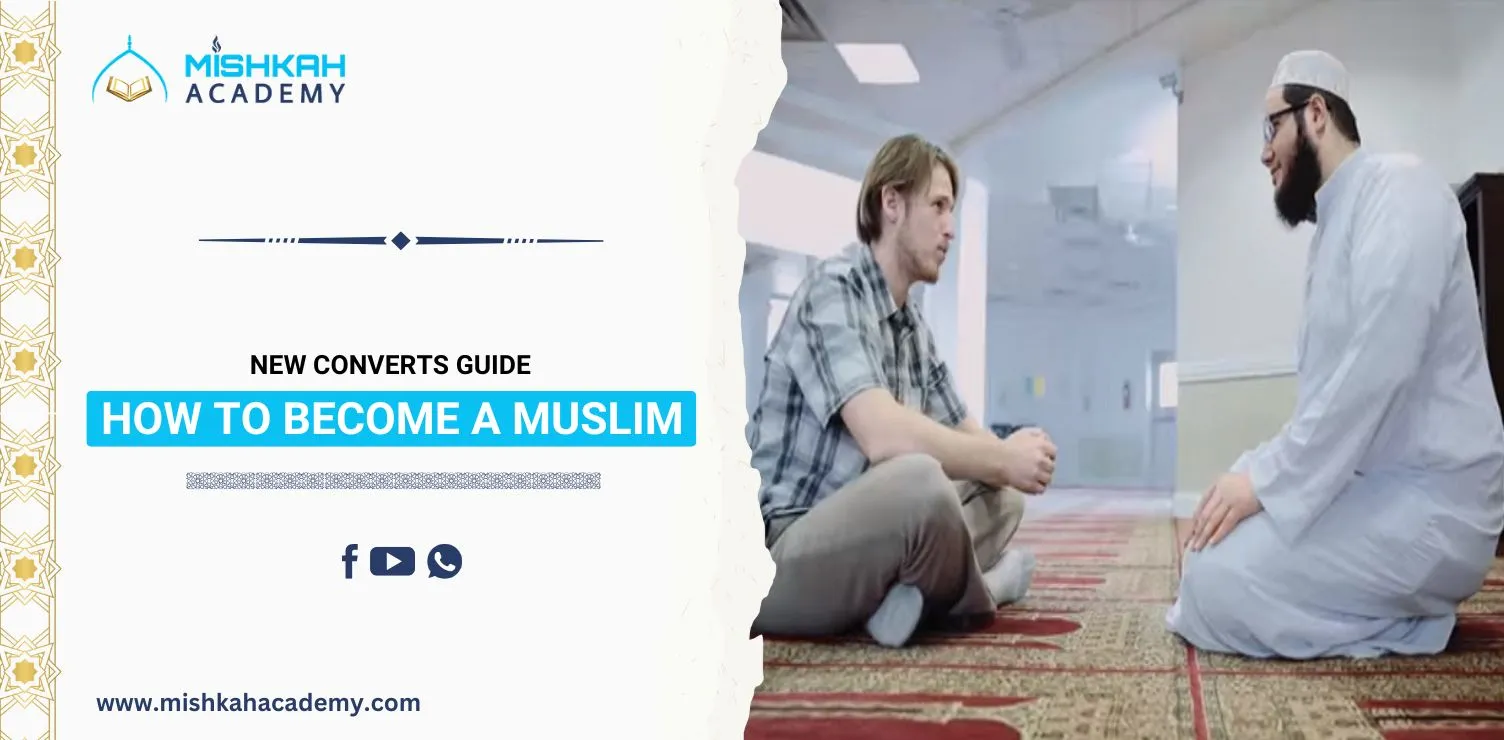To become a Muslim, or to deepen one’s understanding of Islam, there are specific steps that anyone can follow. Whether you’re a non-Muslim interested in converting, or someone who wants to practice Islam more sincerely, these steps can guide you. Islam emphasizes core beliefs, personal cleanliness, prayer, and continuous learning.
Starting with understanding the core beliefs, and then sincerely reciting the Shahada, you’ll learn to integrate daily practices like prayer, Quran reading, and connecting with other Muslims and joining new muslim classes.
10 Tips to Become a Muslim for New Islam Converts
Table of Contents
ToggleThis article outlines ten practical steps to become or grow as a Muslim, focusing on faith, actions, and personal growth.
1. Understand the Core Beliefs and Principles of Islam
To truly embrace Islam, understanding its core beliefs is essential. These beliefs are known as the Articles of Faith, which include:
- Belief in Allah: The One and Only God, with no partners.
- Belief in Angels: They carry out Allah’s commands.
- Belief in the Divine Books: Revelations given to prophets, including the Quran.
- Belief in Prophets: Messengers of Allah who guide humanity.
- Belief in the Day of Judgment: Accountability for actions.
- Belief in Predestination: Everything happens according to Allah’s plan.
These beliefs build the foundation of a Muslim’s faith. They instill purpose, guiding one toward good deeds and fulfilling life in line with Allah’s guidance.
2. Learn the Meaning of Shahada
The Shahada is the declaration of faith that marks a person’s entry into Islam. Its meaning is: “There is no god but Allah, and Muhammad is His Messenger.” This statement embodies the essence of Islam—recognizing the oneness of Allah and acknowledging Prophet Muhammad (peace be upon him) as His final messenger.
Accepting or making Shahada means committing to a life centered around these beliefs, rejecting idolatry, and embracing pure monotheism. This understanding strengthens a Muslim’s identity and purpose, keeping one focused on fulfilling Allah’s guidance. The Shahada is not just words; it’s a way of life that connects a believer to Allah and the teachings of His Prophet.
3. Say the Shahada with Sincerity
To fully become a Muslim, reciting the Shahada (لَا إِلٰهَ إِلَّا اللهُ مُحَمَّدٌ رَسُولُ اللهِ) must be done sincerely, without doubt or hesitation. Sincerity is crucial because it reflects genuine faith, not just outward acceptance. Insincere faith, known as hypocrisy (nifaq), is disliked by Allah. The Quran warns, “Indeed, the hypocrites will be in the lowest depths of the Fire” (Surah An-Nisa, 4:145).
Saying the Shahada sincerely aligns the heart and mind with the words, creating a strong foundation for a Muslim life. This true commitment motivates a person to perform good deeds, follow Islamic teachings, and stay true to their faith.
4. Begin Daily Prayers (Salah) and Do Zikr
Performing the five daily prayers (Salah) and engaging in zikr (remembrance of Allah) are vital practices for every Muslim. Salah connects a person to Allah multiple times a day, creating discipline and spiritual growth.
In addition, zikr involves phrases like SubhanAllah (Glory be to Allah), Alhamdulillah (All praise is for Allah), and Allahu Akbar (Allah is the Greatest). These words remind a Muslim of Allah’s greatness and mercy, keeping their heart attached to Him. Together, Salah and zikr foster a deep sense of gratitude and humility, encouraging a life filled with good deeds.
5. Follow Basic Cleanliness Guidelines
Cleanliness is a fundamental aspect of being a Muslim. Islam teaches that purity of body and spirit is essential for worship. A well-known hadith states, “Cleanliness is half of faith“ (Sahih Muslim). The Quran also emphasizes,
“Indeed, Allah loves those who are constantly repentant and loves those who purify themselves“ (Surah Al-Baqarah, 2:222).
Maintaining cleanliness is crucial because one cannot perform Salah (prayer) while in a state of impurity. Muslims are encouraged to always remain clean, as it reflects respect for themselves and for Allah.
Start Your Islam Learning Journey Today6. Familiarize Yourself with the Quran and Hadith
Learning from the Quran and Hadith is essential for anyone who wants to understand Islam deeply. The Quran is Allah’s final revelation, while Hadith records the teachings and actions of Prophet Muhammad (peace be upon him). Both guide Muslims on how to live righteously.
- Strengthens understanding of Allah’s guidance.
- Teaches right from wrong with clear examples.
- Inspires good deeds and moral behavior.
- Provides solutions for daily challenges.
- Motivates a stronger connection to faith.
Familiarity with these sources helps a Muslim grow spiritually, making it easier to maintain faith and perform good deeds. Consistent study of the Quran and Hadith strengthens a Muslim’s identity and devotion.
7. Learn and Practice the Five Pillars of Islam
| Pillar | Description |
| Shahada | Declaration of faith in Allah and His Messenger. |
| Salah | Performing five daily prayers. |
| Zakat | Giving charity to the needy. |
| Sawm | Fasting during the month of Ramadan. |
| Hajj | Pilgrimage to Mecca, if financially able. |
The Five Pillars of islam are the foundation of Islamic practice. Each pillar strengthens faith and fosters discipline. Praying regularly, giving charity, fasting, and striving to complete Hajj all contribute to a Muslim’s character and spiritual growth.
8. Practice Halal Living
Practicing halal living means making choices that align with Islamic teachings. This involves consuming only halal food, avoiding harmful substances, and choosing lawful means of earning. The Quran advises, “O you who have believed, eat from the good things which We have provided for you“ (Surah Al-Baqarah, 2:172).
Additionally, a hadith emphasizes, “That which is lawful is clear and that which is unlawful is clear” (Sahih Bukhari). Halal living purifies a Muslim’s lifestyle, keeping them close to Allah’s guidance. Choosing halal options promotes good health, honesty, and integrity.
9. Ask for Forgiveness of Your Sins from Allah (SWT)
Seeking forgiveness is an essential part of a Muslim’s journey, as it helps cleanse the heart and soul. Allah (SWT) encourages believers to repent and promises mercy for those who seek it. The Quran states,
“So seek your Lord’s forgiveness and turn to Him in repentance. Surely my Lord is Most Merciful, All-Loving.” (Surah Hud, 11:90).
Repentance reminds Muslims of Allah’s mercy, humbling them and guiding them to correct their mistakes. Regularly asking for forgiveness strengthens a Muslim’s faith and commitment to good deeds, as it keeps one aware of their actions.
10. Indulge in Supplication (Dua) for Basic Tasks
Making dua (supplication) is a powerful way to seek Allah’s guidance and blessings in daily life. Duas help keep a Muslim mindful of Allah in every action, reinforcing dependence on Him. Some simple yet meaningful duas include:
- Bismillah (بِسْمِ اللهِ) — “In the name of Allah” (for starting tasks).
- Alhamdulillah (الْحَمْدُ لِلَّهِ) — “All praise is for Allah” (to express gratitude).
- Astaghfirullah (أَسْتَغْفِرُ اللّٰهَ) — “I seek forgiveness from Allah.”
Reciting these duas throughout the day builds a habit of remembering Allah in all aspects of life.
What is Required to Become a Muslim?
To become a Muslim, one must sincerely declare the Shahada, or testimony of faith: “La ilaha illallah, Muhammadur Rasulullah” (لَا إِلٰهَ إِلَّا ٱللَّٰهُ، مُحَمَّدٌ رَسُولُ ٱللَّٰهِ) — “There is no god but Allah, and Muhammad is His Messenger.” Pure intentions are essential, as faith requires true belief and sincerity.
The Quran emphasizes, “Say, ˹O Prophet,˺ “I am only a man like you, ˹but˺ it has been revealed to me that your God is only One God. So whoever hopes for the meeting with their Lord, let them do good deeds and associate none in the worship of their Lord.“ (Surah Al-Kahf, 18:110). This devotion forms the foundation of Islam.
What are the Rules of Being a Muslim?
Being a Muslim involves following core practices known as the Five Pillars of Islam, which guide faith and actions:
- Profession of Faith (Shahada): Declaring, “There is no god but Allah, and Muhammad is His Messenger.”
- Prayer (Salat): Praying five times daily facing Mecca.
- Alms (Zakat): Giving to the needy, usually 2.5% of one’s savings.
- Fasting (Sawm): Observing fasts during Ramadan.
- Pilgrimage (Hajj): Performing the pilgrimage to Mecca, if financially and physically able.
Conclusion
Becoming a Muslim is about embracing core beliefs and following essential practices that nurture faith and strengthen one’s connection with Allah.
Mishkah Academy stands out as a leader in guiding new Muslims through muslim reverts classes. With experienced Mishkah Academy tutors and years of expertise, Mishkah provides reliable support to help individuals on their journey to faith, offering personalized and accessible learning for all.
Start Your Islam Learning Journey Today





